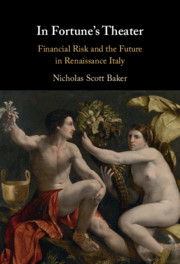Book contents
- In Fortune’s Theater
- In Fortune’s Theater
- Copyright page
- Contents
- Figures
- Preface
- Acknowledgments
- Note on the Text
- Introduction
- 1 Experts in Futurity
- 2 The Future in Play
- 3 Trust in the Future
- 4 The Mercantile Vocabulary of Futurity in Sixteenth-Century Italy
- 5 The Renaissance Afterlife of Boethius’s Moral Allegory of Fortuna
- 6 The Emerging of a New Allegory in Mercantile Culture
- 7 The Shifting Image of Fortuna
- 8 The Separation of Fortuna and Providence
- Conclusion
- Bibliography
- Index
4 - The Mercantile Vocabulary of Futurity in Sixteenth-Century Italy
Published online by Cambridge University Press: 19 July 2021
- In Fortune’s Theater
- In Fortune’s Theater
- Copyright page
- Contents
- Figures
- Preface
- Acknowledgments
- Note on the Text
- Introduction
- 1 Experts in Futurity
- 2 The Future in Play
- 3 Trust in the Future
- 4 The Mercantile Vocabulary of Futurity in Sixteenth-Century Italy
- 5 The Renaissance Afterlife of Boethius’s Moral Allegory of Fortuna
- 6 The Emerging of a New Allegory in Mercantile Culture
- 7 The Shifting Image of Fortuna
- 8 The Separation of Fortuna and Providence
- Conclusion
- Bibliography
- Index
Summary
Like the authors on games examined in Chapter 1, sixteenth-century merchants also constructed an identity based on expertise in futurity. This chapter examines how they did so through the deployment of rich, varied, and precise vocabulary for discussing the opportunities and risk of speculating on future profits. It traces the fine-grained way that merchants discussed the passing of time, demonstrating the ways in which they thought about time and risk as commodities that could be weighed and priced. It develops on Chapter 3, however, by showing these same merchants continued to think about the future and nature of the world in profoundly religious ways, complicating notions of straightforward linear progression for medieval to modern notions of temporality.
Keywords
- Type
- Chapter
- Information
- In Fortune's TheaterFinancial Risk and the Future in Renaissance Italy, pp. 89 - 111Publisher: Cambridge University PressPrint publication year: 2021



